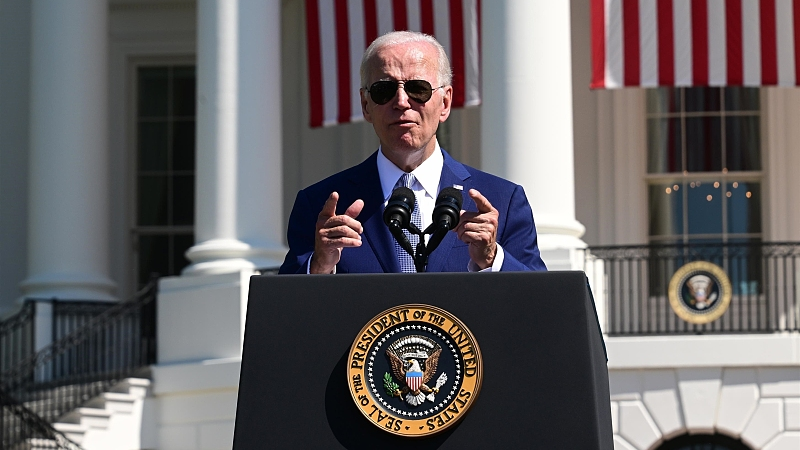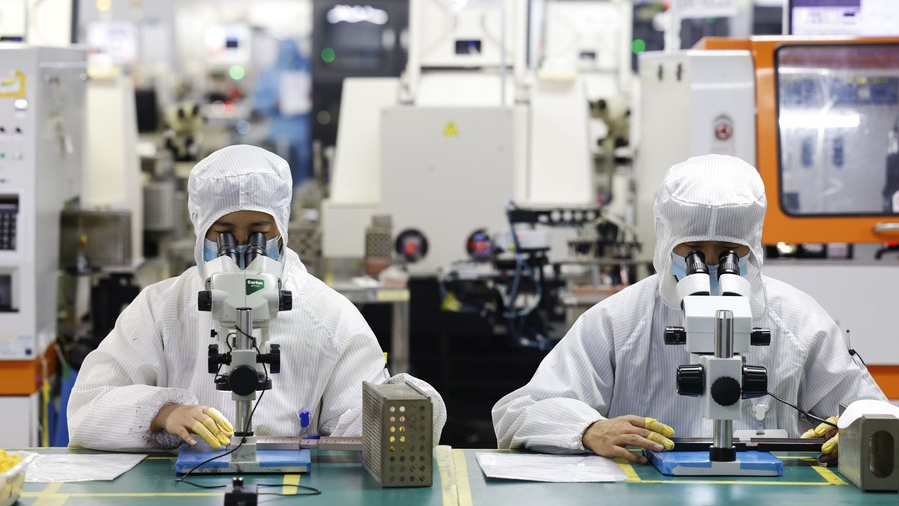
United States President Joe Biden delivers remarks and signs into law H.R. 4346, the CHIPS and Science Act of 2022 on the South Lawn of the White House in Washington, August 9, 2022. /CFP
United States President Joe Biden delivers remarks and signs into law H.R. 4346, the CHIPS and Science Act of 2022 on the South Lawn of the White House in Washington, August 9, 2022. /CFP
Editor's note: Kong Qingjiang is the dean of the School of International Law at the China University of Political Science and Law. Zhai Yucheng is an ajunct senior research fellow of the Academy of International Rule of Law at China University of Political Science and Law. The article reflects the authors' opinions and not necessarily the views of CGTN.
U.S. President Joe Biden signed the bipartisan "CHIPS and Science Act of 2022" (CHIPS Act) into law, and accordingly the United States is going to subsidize its semiconductor industry with nearly $280 billion in five years.
What happened to the country, which has always been passionately advocating a free market economy and opposed other countries' subsidies for unfair competition? No wonder, the decision was a surprise to many international observers.
Even within the United States, it was a historical moment when the Republicans, who have always defended the traditional values of the New Continent, adhered to the free market economy and opposed the industrial subsidy policy, decided to support the CHIPS Act.
Indeed, people have to ask themselves why the flagship country of global capitalism has chosen to embrace subsidy and industrial policy?
At first sight, it appears that the CHIPS Act is enacted to boost the U.S. semiconductor industry, in an attempt to address a long-running computer chip shortage and reduce reliance on other countries, such as China, for manufacturing. It is also aimed at revitalizing America's scientific research and technological leadership, and strengthens America's economic and national security at home and abroad.
As a matter of fact, the CHIPS Act has gone beyond economic considerations. By providing huge subsidies to the U.S. domestic chip industry and providing investment tax credits for semiconductor and equipment manufacturing, the CHIPS Act is expected to compel the semiconductor manufacturers in other countries to relocate to the United States. Moreover, the CHIPS Act identifies certain countries like China as key targets with a goal to severe the links between the semiconductor companies of the targeted countries and those of the United States.

Workers make chips for export at an electronics company in Sihong, east China's Jiangsu Province, February 23, 2022. /Xinhua
Workers make chips for export at an electronics company in Sihong, east China's Jiangsu Province, February 23, 2022. /Xinhua
In other words, the CHIPS Act doesn't promote fair competition between the semiconductor industry in United States and those in other countries. Instead, it is designed to increase the competitiveness of its own industry by weakening the competitiveness of the same industries of the targeted countries, and aimed at making the United States the leader in the industries of tomorrow by preventing the targeted countries from making technological progress through cooperation.
To be specific, the CHIPS Act is a legal instrument to crack down on China's semiconductor supply chain, setting the stage for an intensified, politically charged battle in the complex global semiconductor industry.
The act is discriminatory against foreign companies and arbitrary against "other countries of concern," that the U.S. authority may designate at its will from time to time. The approach highlights that the United States is using government power to intervene the international division of labor in the semiconductor industry and harm the interests of companies from across the world.
It should be pointed out that such measures do not conform with international norms. For example, the massive subsidy, which is a typical specific industrial subsidy, is not only contradictory with the non-discrimination principle embodied in the WTO agreements, but subject to the disciplines on actionable subsidies under the Agreement on Subsidies and Countervailing Measures. In this connection, other affected WTO members may challenge the subsidies in the WTO Dispute Settlement Body.
The CHIPS Act has the effect of restricting the fair trade in global competition, and will have a negative impact on global economic recovery and innovation, particularly where the United States is attempting to forge "Chips 4," an alliance of the U.S., Japan, South Korea and the Taiwan region of China, that aims to improve the semiconductor supply chain. The United States has set up a bad example in semiconductor development. If only politicization of trade issues in the semiconductor field or beyond will give way to marketization rules in the end!
(If you want to contribute and have specific expertise, please contact us at opinions@cgtn.com. Follow @thouse_opinions on Twitter to discover the latest commentaries in the CGTN Opinion Section.)

